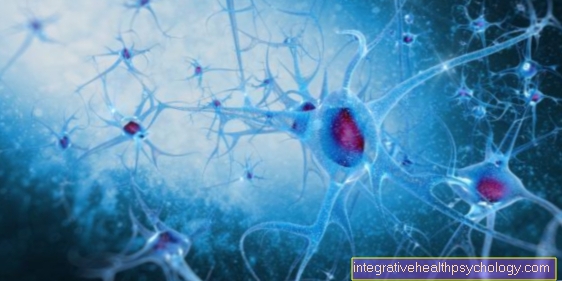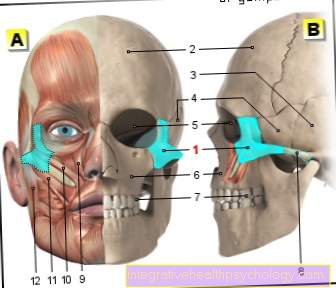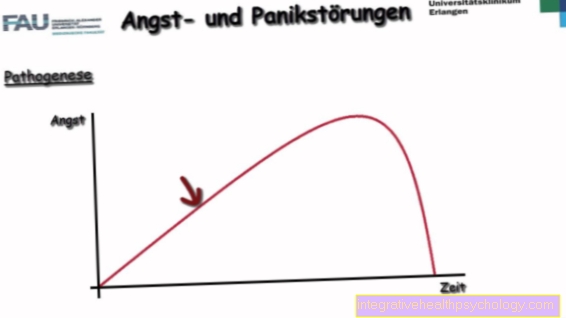Retrograde amnesia
definition
A retrograde amnesia (Latin: retrograde: "in space and time behind", Greek amnesia: "memory loss") is understood to mean a memory loss or the lack of memory and awareness of things and experiences that occurred shortly before a certain event, e.g. an accident. After a severe trauma, for example, the person concerned can no longer remember the course of the accident and this past information is missing. The memory loss usually only lasts a short time before the triggering event. The extent of the memory gap does not have to be related to the severity of the damage.
Read more on this topic: amnesia

causes
All causes that can lead to brain damage and the destruction of cranial nerve tissue are possible triggers for the development of retrograde amnesia. For example, trauma following an accident or a fall can cause memory loss by causing serious injuries to the head or skull and thus also to the brain. This is often associated with a loss of consciousness.
In general, an inadequate supply of oxygen and nutrients to the brain leads to a partially irreversible loss of nerve cells. If those areas of the brain that are responsible for storing information in long-term memory are affected, this can lead to retrograde amnesia. In addition to a concussion, dementia, meningitis (inflammation of the meninges) or an epileptic seizure can result in a loss of memory.
In addition, substances that are toxic to the brain, such as medication, drugs or alcohol, can be triggers if they can cross the blood-brain barrier. Retrograde amnesia can also be a protective mechanism against a serious mental disorder or stress on the person concerned.
After an accident
Serious injuries to multiple organs and often traumatic brain injuries often occur after an accident. On the one hand, this can lead to a loss of consciousness or even a comatose state due to, for example, bleeding in the brain. On the other hand, the overall severe loss of blood can cause circulatory failure and shock. In both respects, this leads to an undersupply of brain tissue with subsequent loss of nerve cells.
The exact cause and the relationship between the brain injury and the extent of memory loss is still unclear. What is certain, however, is that there will be a disruption in the areas of the brain that are responsible for storing or retrieving information in long-term memory. The end result is retrograde amnesia, in which the person concerned can typically no longer remember what happened and has a memory gap in this regard.
After an operation
The anesthesia required during surgery can lead to retrograde amnesia. This is a desired effect of the anesthetics during the operation, so that the patient no longer remembers the operation and thus also the pain that occurred during the procedure.
The drugs given cause certain receptors, so-called GABA receptors, to be influenced. This hinders the storage of new information in long-term memory and at the same time leads to a temporary loss of consciousness. This influence occurs only during the active time of the drug and disappears after the drug has been broken down and excreted, so that usually no subsequent effects on memory function need to be feared.
However, in addition to the anesthetics, the operation itself can also trigger amnesia, especially if surgery on the brain is required.
Read more about this: After-effects of general anesthesia
With alcohol
Some people know from their own experience that the consumption of large amounts of alcohol can lead to a blackout or a film tear. Typically, retrograde amnesia occurs, so that the person concerned e.g. Can't remember details of the previous evening after waking up the next morning. Because alcohol influences the attention and learning processes via so-called GABA receptors. The effect of alcohol varies from person to person, so that one person has memory gaps earlier in the other only later after large amounts of alcohol. In general, however, drinking large amounts of alcohol quickly over a short period of time is more likely to lead to a blackout earlier.
You might also be interested in: Consequences of alcohol
diagnosis
In order to precisely determine the extent of the memory loss, a thorough examination using specific and sensitive test procedures is necessary. The professionally qualified neuropsychologist is responsible for this. In addition to memory performance, he should also examine other cognitive functions such as attention or executive functions (i.e. all higher mental processes that are important for targeted action control). In addition to retrograde amnesia, there are usually other disorders in other brain functions.
In addition to the consultation with the doctor (anamnesis) and the various test procedures, imaging also plays a role, in which the extent of the brain damage can be clarified and related. In this way, among other things, the cause of the retrograde amnesia can also be determined, e.g. a mass or lesions in different areas of the brain can be visualized on CT or MRI. Finally, by measuring brain waves using EEG (electroencephalography), epilepsy, for example, can be detected as the cause of amnesia.
Concomitant symptoms
Depending on the cause of retrograde amnesia, different accompanying symptoms come into question, which are either present at the time of memory loss or can arise afterwards due to the stress of the memory gap.
As a result of a trauma or accident, it is not uncommon for many other damages and complaints, such as Broken bones or injuries to internal organs or massive blood loss, which can lead to shock. Often times accompanying the amnesia there is nausea, vomiting and headache at the time of the occurrence, or afterwards confusion and disorientation about the respective situation.
If the epilepsy is the cause of the amnesia, the symptoms of the seizure are accompanied by a loss of body control, twitching, involuntary cramping and a loss of consciousness. Typically, the person concerned no longer remembers the attack and the time shortly before it.
Furthermore, in the context of almost all dementias such as Alzheimer's disease or Parkinson's disease, there are memory losses, concentration disorders and orientation and attention problems in addition to the symptoms that are specific to the disease.
The amnesia with the memory gaps can put the affected person under severe psychological stress, so that one can observe a depressed, depressed mood.
Anterograde amnesia
The retrograde amnesia is differentiated from the anterograde amnesia, i.e. a memory gap for the subsequent events, i.e. a forward-looking amnesia. The person concerned can no longer save new content and cannot keep the thoughts or only for a very short time after the start of the triggering event. Here, so to speak, the ability to remember or learn new tasks is severely restricted. Overall, anterograde amnesia is observed more frequently, but both forms of amnesia often coexist. For example, after a trauma with loss of consciousness, someone neither remembers what happened after the event, nor can they remember new content after waking up.
Read more on this topic: Anterograde amnesia
Korsakoff syndrome
Korsakoff's syndrome is a special form of amnesia that was previously observed in alcoholics. Nowadays, however, it has been recognized that in addition to chronic alcohol consumption, other triggers for Korsakoff syndrome are possible, such as cerebral haemorrhage, traumatic brain injury, or lack of oxygen. The main reason for this amnesia is the lack of thiamine (vitamin B1), which is important in the human body, among other things. also controls in nerve cells. Therefore, if there is insufficient supply, important brain structures can be destroyed, especially the mamillary body, part of the so-called limbic system, which plays an important role in learning and thinking processes. This results in a poorer retention of new content, often combined with retrograde amnesia. So-called confabulation, a falsification of memories, is typical of this clinical picture. Here, spontaneous thoughts or ideas are simply wrongly accepted as correct and used instead of the gaps in memory.
Treatment / therapy
First of all, therapy for retrograde amnesia consists in treating the actual cause. If there is another disease such as epilepsy, dementia, inflammation or a stroke, this should be treated accordingly.Furthermore, psychotherapy should be considered in the event of extreme emotional stress due to the memory gaps. Probably the most important and most effective therapy is probably the neuropsychological approach. Here, the affected person is taught various learning strategies in intensive training that can improve their memory performance. The use of external memory aids is also recommended to make everyday life easier for the patient. This means that you can e.g. noted important things on a sticky note or on the smartphone so that they are not forgotten.
Finally, memory performance can be influenced by certain drugs. However, the use should be weighed up individually depending on the case and decided with a specialist, because an influence has only been investigated after traumatic brain injury. So drugs like donepezil or methylphenidate are recommended off-label, i.e. that these drugs are actually used for other diseases. Rivastigmine or Physostigmine are also used, both of which increase the concentration of the neurotransmitter (substances that transmit signals in the nervous system) acetylcholine.
Read more about this: Psychotherapy
Duration
It is difficult to give precise information about the duration of retrograde amnesia. The damage to the brain does not necessarily have to be related to the extent of the memory gap. Thus, the duration varies from person to person, with one losing the content for a few seconds or minutes, with others the amnesia can last for up to 24 hours and the person affected has a film tear for the respective period after the triggering event.
There are certainly many factors that can worsen amnesia, but the exact influencing factors are so far relatively unknown. Furthermore, it also differs whether those affected will remember individual circumstances at some point or at all. So it may be that someone can reconstruct what happened again. Over time, some will remember individual thoughts that were previously erased. There are more and more details so that the memory gap can be closed completely. This can happen a few days later or after several years.
forecast
The prognosis of retrograde amnesia depends on the cause of the memory loss. If the cause is clear and it can be treated well, a better course can be expected. If e.g. If an epilepsy or cranial nerve inflammation is recognized and treated immediately, there is less risk of secondary symptoms. Rapid treatment after an accident or fall with a traumatic brain injury is particularly crucial in order to keep the consequential damage as low as possible. Because the loss of consciousness also represents a life-threatening condition. The course can be favorably influenced in retrospect by targeted training of the short-term memory and the renewed activation of the long-term memory. Some even manage to regain the erased memory over time. However, this can take several years.





























